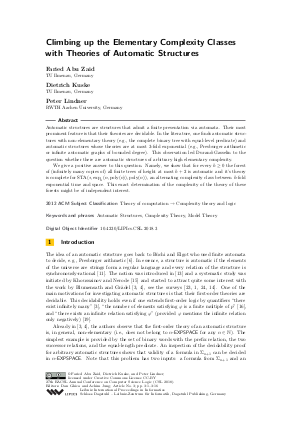Climbing up the Elementary Complexity Classes with Theories of Automatic Structures
Authors Faried Abu Zaid, Dietrich Kuske, Peter Lindner
-
Part of:
Volume:
27th EACSL Annual Conference on Computer Science Logic (CSL 2018)
Part of: Series: Leibniz International Proceedings in Informatics (LIPIcs)
Part of: Conference: Computer Science Logic (CSL) - License:
 Creative Commons Attribution 3.0 Unported license
Creative Commons Attribution 3.0 Unported license
- Publication Date: 2018-08-29
File

PDF
LIPIcs.CSL.2018.3.pdf
- Filesize: 471 kB
- 16 pages
Document Identifiers
Subject Classification
ACM Subject Classification
- Theory of computation → Complexity theory and logic
Keywords
- Automatic Structures
- Complexity Theory
- Model Theory
Metrics
- Access Statistics
-
Total Accesses (updated on a weekly basis)
0Document
0Metadata
Abstract
Automatic structures are structures that admit a finite presentation via automata. Their most prominent feature is that their theories are decidable. In the literature, one finds automatic structures with non-elementary theory (e.g., the complete binary tree with equal-level predicate) and automatic structures whose theories are at most 3-fold exponential (e.g., Presburger arithmetic or infinite automatic graphs of bounded degree). This observation led Durand-Gasselin to the question whether there are automatic structures of arbitrary high elementary complexity. We give a positive answer to this question. Namely, we show that for every h >=0 the forest of (infinitely many copies of) all finite trees of height at most h+2 is automatic and it's theory is complete for STA(*, exp_h(n, poly(n)), poly(n)), an alternating complexity class between h-fold exponential time and space. This exact determination of the complexity of the theory of these forests might be of independent interest.
Cite As Get BibTex
Faried Abu Zaid, Dietrich Kuske, and Peter Lindner. Climbing up the Elementary Complexity Classes with Theories of Automatic Structures. In 27th EACSL Annual Conference on Computer Science Logic (CSL 2018). Leibniz International Proceedings in Informatics (LIPIcs), Volume 119, pp. 3:1-3:16, Schloss Dagstuhl – Leibniz-Zentrum für Informatik (2018)
https://doi.org/10.4230/LIPIcs.CSL.2018.3
BibTex
@InProceedings{abuzaid_et_al:LIPIcs.CSL.2018.3,
author = {Abu Zaid, Faried and Kuske, Dietrich and Lindner, Peter},
title = {{Climbing up the Elementary Complexity Classes with Theories of Automatic Structures}},
booktitle = {27th EACSL Annual Conference on Computer Science Logic (CSL 2018)},
pages = {3:1--3:16},
series = {Leibniz International Proceedings in Informatics (LIPIcs)},
ISBN = {978-3-95977-088-0},
ISSN = {1868-8969},
year = {2018},
volume = {119},
editor = {Ghica, Dan R. and Jung, Achim},
publisher = {Schloss Dagstuhl -- Leibniz-Zentrum f{\"u}r Informatik},
address = {Dagstuhl, Germany},
URL = {https://drops.dagstuhl.de/entities/document/10.4230/LIPIcs.CSL.2018.3},
URN = {urn:nbn:de:0030-drops-96701},
doi = {10.4230/LIPIcs.CSL.2018.3},
annote = {Keywords: Automatic Structures, Complexity Theory, Model Theory}
}
Author Details
References
-
V. Bárány, E. Grädel, and S. Rubin. Automata-based presentations of infinite structures. In Finite and Algorithmic Model Theory, pages 1-76. Cambridge University Press, 2011.

-
L. Berman. The complexity of logical theories. Theoretical Computer Science, 11:71-77, 1980.

-
A. Blumensath. Automatic structures. Technical report, RWTH Aachen, 1999.

-
A. Blumensath and E. Grädel. Automatic Structures. In LICS'00, pages 51-62. IEEE Computer Society Press, 2000.

- Andrzej Ehrenfeucht. An application of games to the completeness problem for formalized theories. Fundamenta Mathematicae, 49(2):129-141, 1961. URL: http://eudml.org/doc/213582.
-
C.C. Elgot. Decision problems of finite automata design and related arithmetics. Trans. Am. Math. Soc., 98:21-51, 1961.

-
S. Feferman and R.L. Vaught. The first order properties of algebraic systems. Fund. Math., 47:57-103, 1959.

-
J. Ferrante and Ch. Rackoff. The Computational Complexity of Logical Theories. Lecture Notes in Mathematics vol. 718. Springer, 1979.

-
J. Flum and M. Grohe. Parameterized Complexity Theory. Springer, Heidelberg, 2006.

-
Markus Frick and Martin Grohe. The complexity of first-order and monadic second-order logic revisited. Ann. Pure Appl. Logic, 130(1-3):3-31, 2004.

-
Ch. Frougny and J. Sakarovitch. Synchronized rational relations of finite and infinite words. Theor. Comput. Sci., 108:45-82, 1993.

- Jakub Gajarský and Petr Hlinený. Faster deciding MSO properties of trees of fixed height, and some consequences. In IARCS Annual Conference on Foundations of Software Technology and Theoretical Computer Science, FSTTCS 2012, December 15-17, 2012, Hyderabad, India, pages 112-123, 2012. URL: http://dx.doi.org/10.4230/LIPIcs.FSTTCS.2012.112.
-
B.R. Hodgson. On direct products of automaton decidable theories. Theoretical Computer Science, 19:331-335, 1982.

-
B. Khoussainov and M. Minnes. Three lectures on automatic structures. In Proceedings of Logic Colloquium, pages 132–-176, 2007.

-
B. Khoussainov and A. Nerode. Automatic presentations of structures. In Logic and Computational Complexity, Lecture Notes in Comp. Science vol. 960, pages 367-392. Springer, 1995.

-
B. Khoussainov, S. Rubin, and F. Stephan. Definability and regularity in automatic structures. In STACS'04, Lecture Notes in Comp. Science vol. 2996, pages 440-451. Springer, 2004.

-
Bakhadyr Khoussainov, Jiamou Liu, and Mia Minnes. Unary automatic graphs: an algorithmic perspective. Mathematical Structures in Computer Science, 19(1):133-152, 2009.

-
D. Kuske. Theories of automatic structures and their complexity. In CAI 2009, Lecture Notes in Comp. Science vol. 5725, pages 81-98. Springer, 2009.

-
D. Kuske and M. Lohrey. Some natural decision problems in automatic graphs. Journal of Symbolic Logic, 75(2):678-710, 2010.

-
D. Kuske and M. Lohrey. Automatic structures of bounded degree revisited. Journal of Symbolic Logic, 76(4):1352-1380, 2011.

-
P. Lindner. Theorien automatischer Strukturen in der Exponentialzeithierarchie. Master’s thesis, TU Ilmenau, 2017.

-
D.C. Oppen. A 2^2^2^cn upper bound on the complexity of Presburger arithmetic. Journal of Computer and System Sciences, 16:323-332, 1978.

-
S. Rubin. Automata presenting structures: A survey of the finite string case. Bulletin of Symbolic Logic, 14:169-209, 2008.

-
F. Stephan. Automatic structures - recent results and open questions. Journal of Physics: Conference Series, 632:012013, 2015.

